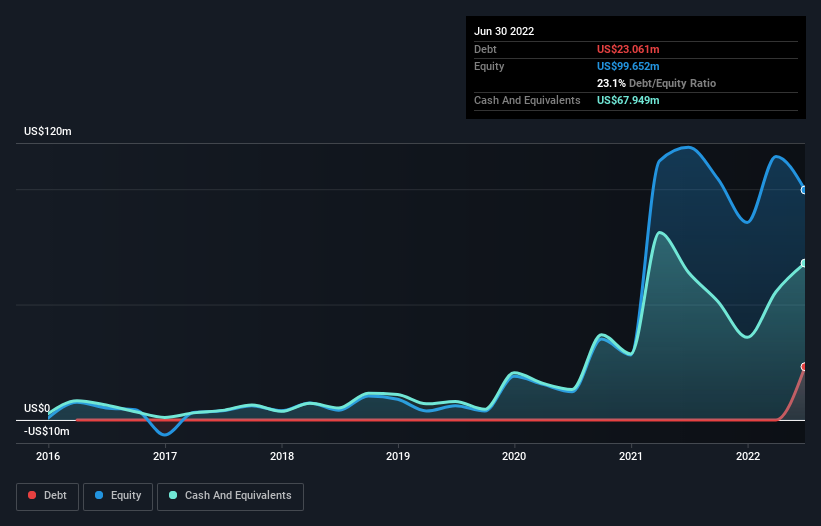
Some say volatility, rather than debt, is the best way to think about risk as an investor, but Warren Buffett famously said that 'Volatility is far from synonymous with risk.' So it might be obvious that you need to consider debt, when you think about how risky any given stock is, because too much debt can sink a company. Importantly, DarioHealth Corp. (NASDAQ:DRIO) does carry debt. But should shareholders be worried about its use of debt?
When Is Debt Dangerous?
Debt assists a business until the business has trouble paying it off, either with new capital or with free cash flow. Ultimately, if the company can't fulfill its legal obligations to repay debt, shareholders could walk away with nothing. However, a more frequent (but still costly) occurrence is where a company must issue shares at bargain-basement prices, permanently diluting shareholders, just to shore up its balance sheet. Of course, plenty of companies use debt to fund growth, without any negative consequences. When we think about a company's use of debt, we first look at cash and debt together.
See our latest analysis for DarioHealth
What Is DarioHealth's Debt?
As you can see below, at the end of June 2022, DarioHealth had US$23.1m of debt, up from none a year ago. Click the image for more detail. But on the other hand it also has US$67.9m in cash, leading to a US$44.9m net cash position.

A Look At DarioHealth's Liabilities
Zooming in on the latest balance sheet data, we can see that DarioHealth had liabilities of US$13.0m due within 12 months and liabilities of US$24.7m due beyond that. Offsetting this, it had US$67.9m in cash and US$5.97m in receivables that were due within 12 months. So it can boast US$36.2m more liquid assets than total liabilities.
This luscious liquidity implies that DarioHealth's balance sheet is sturdy like a giant sequoia tree. On this view, lenders should feel as safe as the beloved of a black-belt karate master. Succinctly put, DarioHealth boasts net cash, so it's fair to say it does not have a heavy debt load! The balance sheet is clearly the area to focus on when you are analysing debt. But ultimately the future profitability of the business will decide if DarioHealth can strengthen its balance sheet over time. So if you're focused on the future you can check out this free report showing analyst profit forecasts.
Over 12 months, DarioHealth reported revenue of US$26m, which is a gain of 100%, although it did not report any earnings before interest and tax. Shareholders probably have their fingers crossed that it can grow its way to profits.
So How Risky Is DarioHealth?
We have no doubt that loss making companies are, in general, riskier than profitable ones. And the fact is that over the last twelve months DarioHealth lost money at the earnings before interest and tax (EBIT) line. And over the same period it saw negative free cash outflow of US$57m and booked a US$81m accounting loss. Given it only has net cash of US$44.9m, the company may need to raise more capital if it doesn't reach break-even soon. DarioHealth's revenue growth shone bright over the last year, so it may well be in a position to turn a profit in due course. By investing before those profits, shareholders take on more risk in the hope of bigger rewards. There's no doubt that we learn most about debt from the balance sheet. However, not all investment risk resides within the balance sheet - far from it. Be aware that DarioHealth is showing 2 warning signs in our investment analysis , you should know about...
Of course, if you're the type of investor who prefers buying stocks without the burden of debt, then don't hesitate to discover our exclusive list of net cash growth stocks, today.
If you're looking to trade DarioHealth, open an account with the lowest-cost platform trusted by professionals, Interactive Brokers.
With clients in over 200 countries and territories, and access to 160 markets, IBKR lets you trade stocks, options, futures, forex, bonds and funds from a single integrated account.
Enjoy no hidden fees, no account minimums, and FX conversion rates as low as 0.03%, far better than what most brokers offer.
Sponsored ContentNew: Manage All Your Stock Portfolios in One Place
We've created the ultimate portfolio companion for stock investors, and it's free.
• Connect an unlimited number of Portfolios and see your total in one currency
• Be alerted to new Warning Signs or Risks via email or mobile
• Track the Fair Value of your stocks
Have feedback on this article? Concerned about the content? Get in touch with us directly. Alternatively, email editorial-team (at) simplywallst.com.
This article by Simply Wall St is general in nature. We provide commentary based on historical data and analyst forecasts only using an unbiased methodology and our articles are not intended to be financial advice. It does not constitute a recommendation to buy or sell any stock, and does not take account of your objectives, or your financial situation. We aim to bring you long-term focused analysis driven by fundamental data. Note that our analysis may not factor in the latest price-sensitive company announcements or qualitative material. Simply Wall St has no position in any stocks mentioned.
About NasdaqCM:DRIO
DarioHealth
Operates as a digital health company in the United States, Canada, the European Union, Australia, and New Zealand.
Excellent balance sheet slight.

